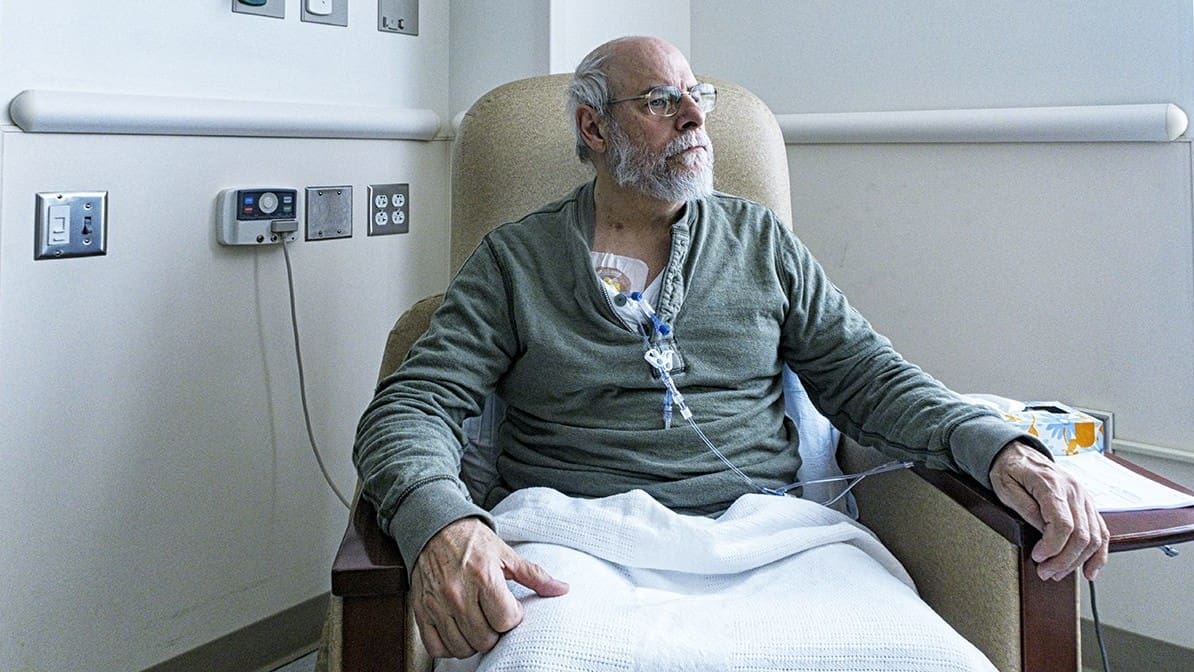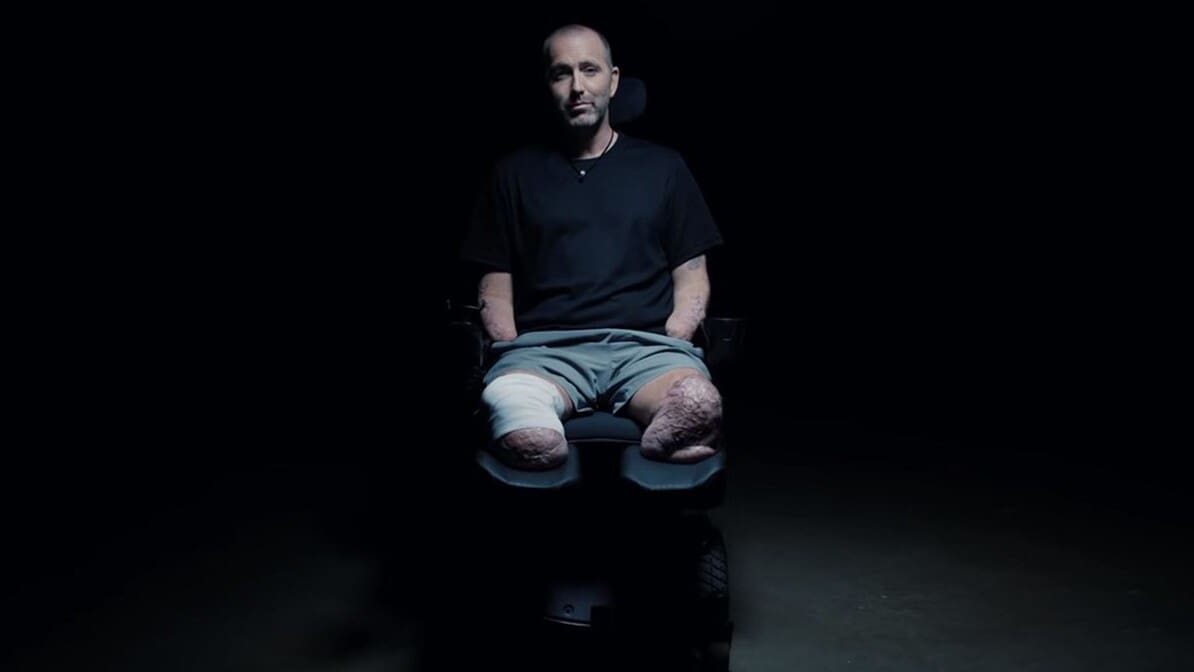
Chris Wark: Beat Cancer Daily (Part 3)
John Farrell: Looking at your personal situation and looking at it from a spiritual sense at the same time, how did God play a role in your healing and why is spiritual health so important?
Chris Wark: Well, I’m a believer and I was a Christian when I was diagnosed with cancer. I’m just very thankful that I had people in my life when I was in college and as a young adult that discipled me and really taught me how to trust God in a big way and how to exercise my faith when the cancer diagnosis happened.
The very first verse that came to mind after my diagnosis was Romans 8:28, which says, “God works all things for the good of those who love Him and who are called according to His purpose.” That verse never meant much to me until that moment. God works all things for your good doesn’t mean much until you have a problem. Right? And then you realize, “Oh, okay. This is what Paul was talking about.”
When Paul wrote that, he had been in prison multiple times. He had been beaten, whipped 39 times the legal limit three times. He had been stoned and beaten with rods. He’d been dragged out of the city and left for dead. He had been shipwrecked multiple times and floated adrift at sea all night. He had gone through all that before he wrote, “God works all things for the good of those who love Him.”
That is a message to someone who is dealing with adversity, not just cancer. Obstacles, challenges, tragedy, trauma, adversity. The promise of God is that He will work it for your good. And when you’re faced with any of those things, the simple act of faith that is required is to say, “You know what? I don’t like this, but I believe that God’s going to work it for my good.” That’s it. It’s choosing to believe. That’s all faith is. It’s a choice to believe.
Faith is not magical. It’s not witchcraft, hocus pocus woo-woo stuff. It’s choosing to believe that God’s Word is true: that He loves you, that He will supply all of your needs, that He will never leave you or forsake you, and that He will work all things for your good.
A New Perspective on Life
JF: Given your own personal experience, how has your perspective on life changed since your cancer diagnosis, and even since you’ve been cancer-free?
Chris: Cancer reset my perspective. It does that for every patient or most patients, I should say, because you realize how many things in life that we tend to chase after or deem as important or prioritize that really are meaningless. The healthy person cares about a lot of things. The sick person only cares about one thing and that’s getting well.
The cancer experience not only taught me how to trust God in a deep way, but how to cast my cares on Him every day and to not live in constant fear for tomorrow. Jesus said, “Don’t worry about tomorrow.” Jesus gives good advice. You should take Jesus’ advice. Don’t worry about tomorrow.
Cancer taught me how to walk out my faith in a much more meaningful way. But then it also helped me understand how to count my blessings. How to live a life of gratitude. How to prioritize events and circumstances and things in life. And how to have an eternal perspective on life. So, my perspective now is that most things that happen that people get all worked up about just don’t matter in light of eternity. They won’t matter. Is this going to matter?
This is something you can ask yourself: “Am I going to be upset about this tomorrow or next week or next year or when I’m 80.” The answer is almost always “no.” Right? And if I’m not going to be upset about this when I’m 80 or next week, then I don’t have to be upset about it now. Living in the present.
Jesus didn’t say it this way, but I believe what He meant was living in the present. He said, “Don’t worry about tomorrow. Today has enough trouble of its own.”
When you’re worried about tomorrow, you’re living in the future. Fear, worry, and anxiety is living in the future. And when you live in the future, you’re robbing yourself of joy today. Worry doesn’t relieve tomorrow of its sorrows. It only robs today of its joy. Conversely, when you are entertaining bitterness and resentment and anger, guilt, and shame, you’re living in the past. All of those emotions are triggered by things in your past.
Sometimes anger can happen in the present moment, but a lot of times you’re living in the past. Also not a good thing. Living in the present is thanking God every day for the blessings you have in your life: that you can see. That you can hear. That you can take care of yourself. That you can get out of bed. That you’re not in the hospital.
No matter what your situation, there’s one thought that – it’s almost like a cheat code in a video game – it’s a mental hack or a cheat code. If you want to use that terminology, that works for me every time. And that is this. I talk about this in Beat Cancer Daily. Anytime I’m feeling discouraged or down or frustrated or mad about something that’s going on in my life, all I have to do is think this one thought: right now, there’s someone dying in the hospital who would give anything to trade places with you.
JF: That’s a powerful way to look at it.
Chris: That’s it. That’s all it takes. And it was just like that’s a hard reset for me. Just bam. Oh, yeah. I’m not in the hospital. I’m not dying. This is a trivial problem that I will overcome or don’t need to worry about or don’t need to be upset about. Let it go. Give it to God. Forgive. Be quick to forgive.
Forgiveness is a huge theme in the new book Beat Cancer Daily. Throughout the book it’s a continual theme because unforgiveness and bitterness and resentment are some of the most toxic emotions that we carry with us. And the longer you are bitter, the more bitter you become.
Bitterness. Just the word itself. We all have met people who are elderly that are just sour and bitter people. These people weren’t born that way. They didn’t come out of their mother’s womb angry and bitter and cynical and judgmental, but through their choice of thought they allowed themselves to become increasingly more negative and bitter over a lifetime. So, if you feel like that is the kind of person you’ve become, I just want you to know that you can change that. You don’t have to be that way, but it takes deliberate daily action of choosing to think differently, choosing positivity over negativity, choosing to love and forgive and let go of the pain and hurt that people have caused you and give them to God. Let him deal with them.
That’s what forgiveness is. It’s releasing the pain that people have caused you and trusting that God will work all things for your good and that ultimately He’s the judge. He’s the judge. He will right every wrong and He’ll make a way on your behalf.
The most powerful lesson is that when people wrong you, they set you up for blessing. This is a position of faith that I don’t think we’ve been taught in the church and I think needs to be taught. When people wrong you, they set you up for blessing because God works all things for your good.
When Joseph was sold into slavery. That’s the worst thing I can imagine. As a kid, teenager to be somebody’s slave. Taken away from our family. Never see him again. Betrayed by my own brothers. And yet had they not done that he would not have been put in position. It’s a long story, right? All that he went through. But had his brothers not sold him into slavery, he would not have ended up eventually in the position to become the second in command over all of Egypt. That terrible wrong that was done to him God used to exalt him and elevate him to a position of power and authority. And not only that, he chose to forgive his brothers that he rescued
JF: And he didn’t dwell on the hardship they presented him. He made the most of it.
Chris: He did. He made the most of it. When he rescued his whole family from famine, he brought them all to Egypt. When his father died, his brothers came to him begging for their life because they thought he was going to finally get his revenge and kill them. And he forgave them. He said, “What you intended for evil, God intended for good.” That’s so good. So that many could be saved.
Jacob’s story is one of my favorite stories in the Bible because you’ve got this incredible injustice followed by an incredible blessing. And then just a remarkable act of forgiveness.
Lesson Learned
JF: Looking back at when you were writing Beat Cancer Daily, what did you learn about yourself?
Chris: That’s kind of a tough question. I guess the thing that I realized about myself while writing it was that I need inspiration and encouragement and reminders every day just like everybody else. The book was as much written for me to catalog and organize my own daily reader and devotional as it was for anyone else. So, I wrote it for myself as much as I did for anyone else.
JF: Fair enough. I’ve read somewhere that you were featured in a documentary called the C Word. What was your role in the C Word and what is the documentary about?
Chris: The C Word was a documentary on the current state of cancer treatment and the cancer industry and the fact that diet and lifestyle can make a huge impact on survival. I was interviewed as part of that documentary. It’s not about me, but I was interviewed and featured in it as a cancer survivor and patient advocate.
The neat thing about it is that it was produced and narrated by Morgan Freeman. It won some film festival awards and things. So, that was neat to be a part of.
JF: Is there anything that you would like to add that I may have not asked or something that you perhaps want to reemphasize?
Chris: I’ll just make a general statement about Beat Cancer Daily. Beat Cancer Daily is a hybrid between a daily devotional and a daily reader. There are themes throughout the book, and those themes are how to choose faith over fear, how to be courageous, how to take care of yourself through better diet and lifestyle choices, how to find the positives in negative situations, how to look at obstacles as opportunities, and how to practice gratitude and live a life of joy and how to let go of pain that other people have caused you through forgiveness.
…
Order a copy of Beat Cancer Daily: 365 Days of Inspiration, Encouragement, and Action Steps to Survive and Thrive by Chris Wark
Trending Now
Sign up today for your Inspiration Today Daily Newsletter
Supercharge your faith and ignite your spirit. Find hope in God’s word. Receive your Inspiration Today newsletter now!
John Farrell
John Farrell serves as the Digital Content Manager at Inspiration Ministries, where he oversees the planning, organization, and management of website content to support the ministry's global digital outreach. With a strong background in writing and editorial strategy, John ensures that the articles, devotionals, and discipleship resources on Inspiration.org are accurate, engaging, and aligned with the ministry's mission.
John has authored more than 1,000 articles, press releases, and features for Inspiration Ministries, NASCAR, Lionel, and Speed Digital. His versatility as a writer is also showcased in his 2012 book, The Official NASCAR Trivia Book: With 1,001 Facts and Questions to Test Your Racing Knowledge.
A graduate of Appalachian State University, John brings excellence and attention to detail to the digital experience at Inspiration Ministries. He lives in Concord, N.C., with his wife and two sons.
Related Articles
January 28, 2026
I Just Knew It Was God: From Searching to Finding Faith
From the outside, Ekaterina’s life looked successful. She had a college degree, a strong career,…
January 26, 2026
How to Overcome Old Wounds with Resilience
How Do You Deal with Old Wounds? Everyone is talking about trauma, but very few are talking about…
November 21, 2025
Thank You … Lord
Gratitude transforms our lives and draws us closer to God. This article explores how practicing…
October 27, 2025
So, Is God Good?
Many people wrestle with the question, is God good, especially when life brings pain and loss.…
Next Steps To Strengthen Your Walk
Inspiration Today Newsletter
Supercharge your faith and ignite your spirit. Find hope in God’s word. Receive your Inspiration Today newsletter now!
Christian Articles
Find articles to strengthen your walk and grow your faith. We have a wide range of topics and authors for you.
Submit A Prayer Request
We are here for you. Simply click on the button below to reach us by form, email or phone. Together we will lift our hearts and voices with you in prayer.





